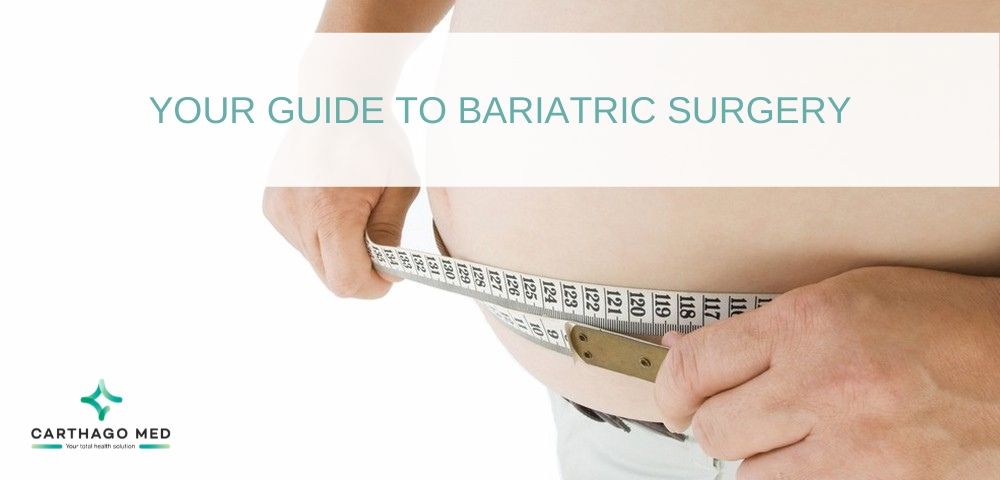Need Informations ? ( +216 ) 22 960 337
Your guide to bariatric surgery

Your guide to bariatric surgery
Bariatric surgery: for whom is it destined?
Having recourse to bariatric surgery is no slight decision. Indeed, your surgeon will be identifying indications and evaluating the benefits/risks of any procedure (depending on individual medical cases) after having thoroughly examined a patient’s complete medical history. Bariatric surgery is considered only as a weight-loss alternative if the patient’s body has failed responding to other pluridisciplinary medical attempts (of minimum 6 to 12 months).Prerequisite conditions of bariatric surgery are:
-suffering from overweight
-unsuccessful attempts of different weight-loss diets
-having no contraindications to the surgery or to general anesthesia
-having no psychological troubles or eating disorders
-being ready to adopt a healthy lifestyle of regular exercising and dieting prior and after the surgery
What is bariatric surgery?
Bariatric surgery aims at improving the health of overweight patients by ensuring sustainable weight-loss and the gradual incorporation of healthier habits into their lifestyle.Techniques used in bariatric surgery depend on the patient’s age, their general health status and obesity type.
We distinguish two principal and frequently-performed surgical types of bariatric surgery that modify the digestive system anatomy: The first ones are restrictive interventions that reduce the volume of the stomach and decelerate food passage:
-Gastric band surgery:
Gastric band surgery is a band that is surgically implanted around the top portion of the stomach to help a person lose weight.
-Sleeve gastrectomy or gastric sleeve:
Gastric sleeve is the surgical removal of a large portion of the stomach. The second type of interventions is mixed; they are both restrictive and malabsorptive. They consist in the reduction of absorbed food quantities, hence the consequent and important loss of weight:
-Gastric bypass:
Gastric bypass involves creating a small pouch from the stomach and connecting the newly created pouch directly to the small intestine. Swallowed food will therefore go into this small pouch of the stomach and then directly into the small intestine.
What happens after bariatric surgery?
Obesity is a chronic disease, and the risks of losing and gaining weight are elevated, thus the importance of regular medical follow-up. Monitoring will help the patient maintain good habits, stabilize their ideal weight, and adopt a healthy and positive lifestyle after the surgery.After restrictive surgery, the patient has to be fed soft and fractionated food for a period of 15 days before resuming normal eating habits.
Gastric sleeve does not engender nutritional deficiencies, hence the unnecessity of food supplements. However, a regular check-up every 3 months is needed during the first year, then every 6 months during the second, and every year after. As far as mixed interventions are concerned (gastric bypass), food has to be liquidy and fractionated for a period of 15 days after the surgery, then gradually making it softer. It is possible to resume normal eating habits after a month. Nutritional deficiencies appear after bypass and iron supplements as well as vitamins b12 and folates have to be introduced.
The reintroduction of sugar is considered starting from the third month (just to avoid dumping syndrome). The gastric dumping syndrome or rapid gastric emptying occurs when digested food exits the stomach a bit too quickly and can therefore stimulate the liberation of excessive quantities of insulin in the blood (this can cause reactive hypoglycemia). Regardless of the performed surgical technique, medical follow-up has to be 4 visits per year during the first year, then 1 to 2 visits per year at minimum. It is also imperative to adopt a healthy lifestyle of regular exercising and dieting.
Why having recourse to bariatric surgery?
Numerous research have highlighted the benefits of bariatric surgery on the overweight. Several years after the intervention, weight-loss can reach up to 40% of the initial weight (until reaching a stable weight). The metabolism also adjusts to nutritional changes and the patient’s lifestyle is improved. Underlying diseases caused by overweight are also avoided: such as high blood pressure, dyslipidemia and diabetes (which is cured in 75% of the cases).In order for the surgery to succeed, the patient has to respect their engagements once at home. This includes adopting a healthy lifestyle (a permanent change of eating habits, regular physical exercising, taking prescribed food supplements, respecting medical follow-ups, etc.)
See More









